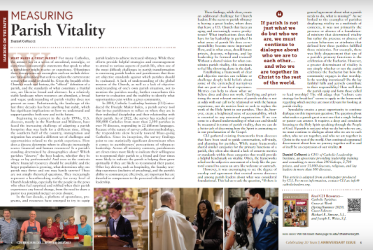“Confession is an encounter with Jesus whose mercy motivates us to do better.”
– Pope Francis
On a recent quick trip to Rome for work, I had a narrow window of free time. I thought I would pop into St. Peter’s Basilica to say a prayer and pay my respects to Pope Emeritus Benedict XVI. Fortunately, or unfortunately, “popping in” isn’t easy, given both the crowds and security. When I got to St. Peter’s Square, the line to enter reached the top of the piazza which was better than I expected. As one gets closer to the actual security checkpoint, there are lines of formal "amusement park” zigzag barriers. About a third of the way through this section, those of us in the queue noticed two women butting in line. They seemed to be employing the “play dumb, ignore the hundreds of people patiently waiting, and hope no one calls you out” strategy. This quintessential Italian move tends to involve looking around with a confused face as if desperate to find signage directing you on what to do, when in fact, you are avoiding eye contact with the mass of humanity right in front of you, doing the exact thing you should be doing. As the women breezed by and passed people in the zigzag, I could hear some whispers and scoffs in multiple languages.
As they drew closer to me, a fellow Italian blocked their path and, with the expected passion Italians bring to most encounters, she confronted the pair: “Do you see everyone in line?” The two women continued to search around as if the voice was from heaven. “Right here. Look at me,” the woman continued, “My name is Susanna. You don’t think what you are doing hurts anyone because you do not know who we are. But if you knew us, would you do it? I’m Susanna.” She motioned to those of us in front of her and rallied us, “tell these women your names. Tell them who you are so they know who they are hurting.” Of course, most of the non-Italian tourists didn’t know what she was saying, but they knew what she was doing. As the two line-hoppers tried to advance past their prosecutor, people stared at them in their face and started to fill in the zigzag so they couldn’t get through. Ultimately, a group of Korean capuchins flocked out to completely jam the line in their sea of brown robes. Realizing there was literally no way forward, the women ducked out of line.
As I passed through the metal detectors and began my stroll to enter the basilica, my first reaction was to be sad for what I thought was such a “non-Christian” scene at such a sacred place. I made my way around the church and came upon the open confessionals awaiting pilgrims in various languages. Then it struck me: maybe the encounter didn’t require all the drama that Susanna brought to it, but perhaps it was a very Christian thing – perhaps the most Christian thing – that happened in the piazza that day. As a Catholic leader, do I see the call to be “one in Christ” as an invitation to put my head down, live my own life toward holiness, and simply murmur and whisper as I see others hurting themselves or the community? Or do I understand my responsibility to know people by name, to encourage them, and yes, to also challenge them to something more and expect others to do the same for me? How do I understand my responsibility to this community of faith?
We all step out of line sometimes. We all rationalize that our decisions won’t really hurt anyone, and that on the budget of righteousness, our credits outweigh our debits. Can we remember that the gift of the Church is a community that should call us to think like God and not like man? As we begin Lent this week, prayers that we be AND have a Susanna in our lives of faith…maybe with fewer hand gestures.
Enjoy Dan's reflections? Check out this piece that was recently published by The Church in the 21st Century (C21) Center at Boston College. You can view Dan's article, Measuring Parish Vitality, on pages 4-5 of their publication, linked here.

CLI serves Church leaders, helping them rediscover their potential and forming them to be more intentional with those they serve.
CLI helps empower and energize Catholic leaders by providing focus and courage to engage the culture with an apostolic mindset.
CLI provides vision and hope about the future of the Church with a humble, yet strategic approach.



